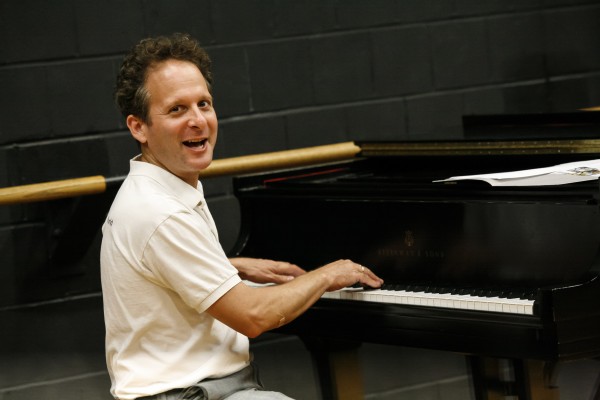
Eli Yamin at the keyboard at The Jazz Drama Program’s Summer Jazz Arts Institute at Lehman College, City University of New York (photo by Ayano Hisa)
We did it! On July 1 and 2, we broke ground on the first ever Jazz Drama Program Summer Jazz Arts Institute. With my great colleagues LaFrae Sci, Tom Dempsey, Shireen Dickson, and Jeanie LoVetri we launched what we hope will be a vital charging station for imaginative education through jazz for years to come. Thanks to Lehman Stages at my alma mater, Lehman College, City University of New York in the Bronx, we had two days to go deep into different modalities of teaching and learning in jazz. We asked questions about what do teachers and students need to have a great experience exploring jazz? What fundamental skills and aesthetic values do they need to access? How can we deliver them in an engaging, enriching and revitalizing manner?
After I gave a brief introduction to the Institute, master singing voice specialist Jeannette LoVetri gave a stunning two-introductory overview of Somatic Voicework ™, the LoVetri Method. This method of training singers prepares you to sing jazz and blues by developing your awareness of the different registers of the voice-head and chest and how to mix them with ease to get the particular sounds and vocal flavors that you want. It may seem obvious that singing the blues is different then singing Italian opera, but for too long, there has been little formal training available to those of us who want to sing American styles of music, most of which flow out of the blues. Jeanie’s method is based in up to the minute information from leading doctors and medical researchers in the field of voice science and it was a tremendous treat to hear directly from Jeanie how we can begin to develop a healthy foundation for learning and teaching singing jazz and blues. For more information on Jeanie’s teaching method, visit Somatic Voicework
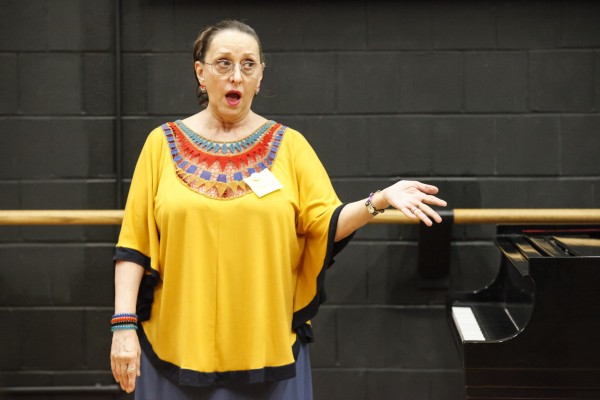
Jeannette LoVetri at The Jazz Drama Program’s Summer Jazz Arts Institute at Lehman College, City University of New York (photo by Ayano Hisa)
Next, Jazz Drama Program Dance Director, Shireen Dickson, gave us a hands on workshop in Making Jazz-Based Dances. The dance workshop scaffolded specific universal jazz qualities onto pedestrian (everyday) movement to demonstrate how easily movement phrases can be developed to tell stories. While the class’s primary objective was to demonstrate how a jazz platform can offer an immediate point of entry for all bodies, and how this technique is used when working with JDP youth, the session also modeled very clear hallmarks of JDP’s dance education rubric: body percussion, musical phrasing, rhythmic pedestrian movement, improvisation, collaboration, and sharing.
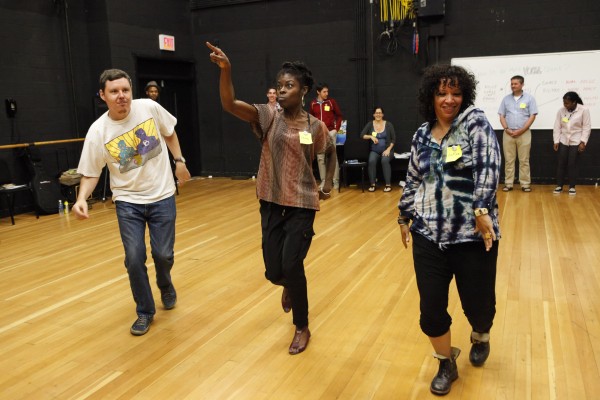
Teaching Artist Judd Nielson, Dance Director Shireen Dickson, Board Member LaFrae Sci explore syncopated movement in dance workshop. (Photo by Ayano Hisa)
Day One concluded with teaching artist, drummer and composer LaFrae Sci leading participants into the well of African American song and rhythm from which jazz music and culture flows. This session combined vocal, rhythmic and body movement to explore spirituals and the blues as a foundation of jazz learning across disciplines: vocal, instrumental, solo, dance and theatrical work. The session was presented as a critical complement to more traditional, foundational jazz instrumental and vocal learning and guided participants to embody blues vocal expression as well as the shuffle rhythm as the foundation of swing and the key to accessing the healing properties of jazz.
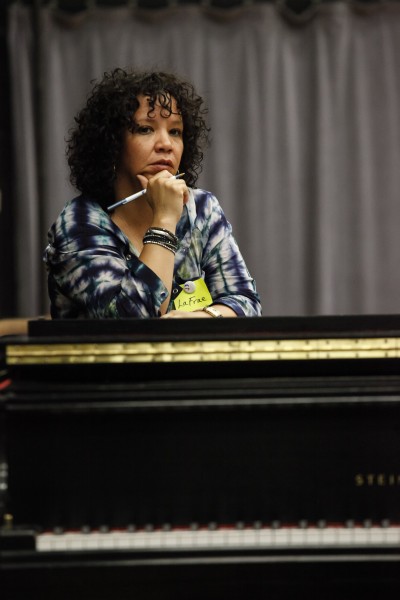
LaFrae Sci at The Jazz Drama Program’s Summer Jazz Arts Institute at Lehman College, City University of New York (photo by Ayano Hisa)
Day Two began with a review of Somatic Voicework ™, the LoVetri Method, led by teaching artist, singer and songwriter, Cindy Hospedales, who is also a Level III certified Somatic Voicework teacher. Cindy presented the method as student-centered and ideally suited to meet students where they are at. She showed how isolating registers can help determine vocal issues that need to be addressed and demonstrated specific vowel sounds to use to access head, chest and mix registers and specific strategies for blending and extending range. Cindy emphasized the point that when teaching students to sing, teachers must know how to recognize certain problems that inexperienced singers typically face and have concrete information that provide solutions, especially when it comes to expressive singing in contemporary music, formally known as Contemporary Commercial Music (CCM).
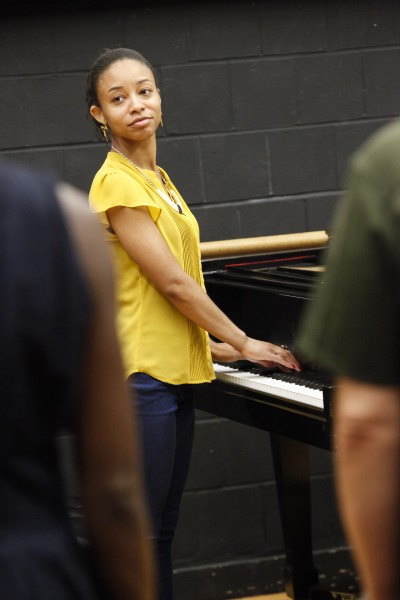
Cindy Hospedales at The Jazz Drama Program’s Summer Jazz Arts Institute at Lehman College, City University of New York (photo by Ayano Hisa)
After the vocal session, teaching artist, guitarist, author and Professor at LaGuardia Community College, Tom Dempsey, led us into a cross-modality exploration of Improvisation. The workshop began with a wide ranging discussion branching off from intriguing quotes on improvisation such as the one below by Ralph Ellison.
“There is a cruel contradiction implicit in the art form itself. For true jazz is an art of individual assertion within and against the group. Each true jazz moment (as distinct from the uninspired commercial performance) springs from a contest in which each artist challenges all the rest, each solo flight, or improvisation, represents (like the successive canvases of a painter) a definition of his identity: as individual, as member of the collectivity and as link in the chain of tradition. Thus, because jazz finds its very life in an endless improvisation upon traditional materials, the jazzman must lose his identity even as he finds it.” Ralph Ellison

Upon listening to Miles Davis Quintet’s live performance (1964) of “My Funny Valentine” with Miles Davis – trumpet, George Coleman – tenor saxophone, Herbie Hancock – piano, Ron Carter – bass, Tony Williams – drums, participants identified key components of jazz improvisation taking place and contributors in the group. There was discussion on the elements of sound (timbre, dynamics, rhythm, articulation, etc) and how the essential aspect of listening fueled meaningful interaction between group members that contributed to the overall masterpiece of the recording. Some key words shared by participants: Playfulness, Feeling, No eraser, Courage Collaboration, Supporting, Vulnerability, Control, Critical thinking, Yes and…, Generosity, Dexterity, Shared language.
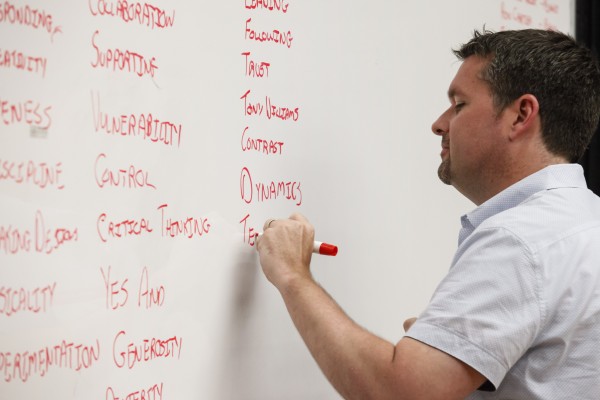
Tom Dempsey at The Jazz Drama Program’s Summer Jazz Arts Institute at Lehman College, City University of New York (photo by Ayano Hisa)
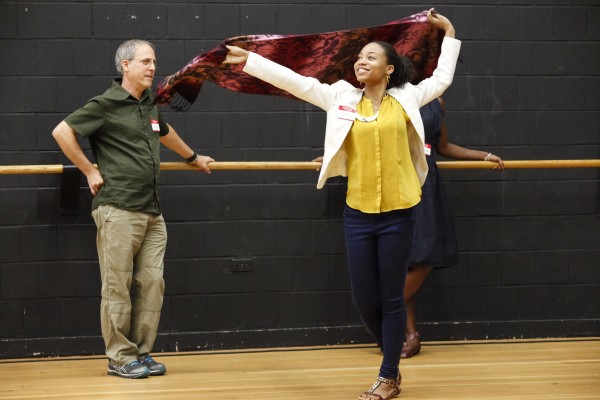
JDP Co-founder Clifford Carlson looks on at Teaching Artist Cindy Hospedales in flight during Improvisation Workshop at Summer Jazz Arts Institute (Ayano Hisa, photo)
The final workshop of the day was led by teaching artist, musician, actor, Program Director at Tribeca Performing Arts Center, Mario Giacalone. The theater workshop complemented yet challenged how participants viewed vocal and physical improvisation from an abstract rhythmic place. With a previous foundation laid in Tom’s Improvisation session, participants, with the clear instructions to “not think just do” and “give yourself permission,” who had never experienced this type of workshop were able to push against comfort boundaries, and see immediate relevance to their own non-theatrical artistic/teaching practices.
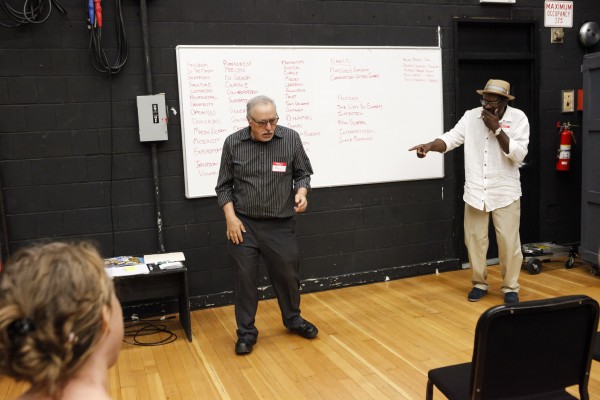
Actor/musician Mario Giacalone and musician Lance Bryant collaborate in the Summer Jazz Arts Institute at Lehman College. (Ayano Hisa, photo)
We concluded the Institute with a discussion that reviewed Jazz Drama Program practices that we experienced in the Institute.
- Teaching in a circle (communal)
- Taking things step by step.
- Embrace the role of women. ** (A lot of awful male performances are seen having prominent roles, whereas women, typically get minor/insignificant roles.
- Emulating/Copying.
- Interactive improvisation/Experiential group.
- Body awareness. Holistic, vocal, body, mindfulness.
- Just do it. Be in the moment and embrace the Judgement Free Zone.
- Permission parameters (Ex. You can do whatever you want in the circle, BUT… do not lose eye contact.)
- Have teachers on equal playing field as students/teachers as facilitators.
- Meeting students where they are.
- Remember to always incorporate the blues, as that is the grounding foundation of JDP.
*** THIS is what differentiates JDP from other European art forms. It separates from emphasis on technical ability and focuses more on freedom/expressing.
- Culture of the blues = Accessible. Comes up from “the people”.
- Inclusive
- Mindfulness of connections between different disciplines. (Dance, Vocalists, etc.)
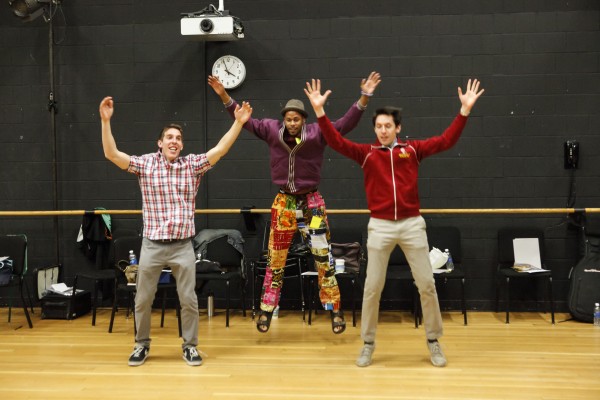
Teachers and Teaching Artists Jump for Joy at Summer Jazz Arts Institute at Lehman College (Ayano Hisa, photo)
We are working on a more detailed paper outlining the activities of The Jazz Drama Program’s Summer Jazz Arts Institute 2015 at Lehman College. Please let me know if you are interested in receiving a copy when its done by leaving a comment below. Also, we are gathering names of teachers and teaching artists who might like to join us next summer at the Institute. We plan to have it around the same time-end of June/early July. You can contact us by visiting The Jazz Drama Program, where you will find the latest information on the organization’s activities and methods.
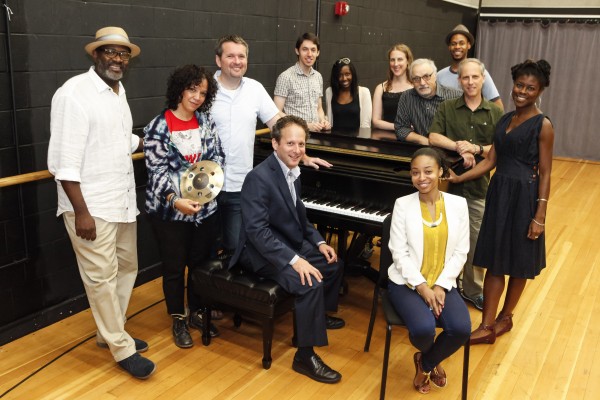
Participants at The Jazz Drama Program’s Summer Jazz Arts Institute at Lehman College, City University of New York(L-R-standing-Lance Bryant, LaFrae Sci, Tom Dempsey, Dmitry Ekshut, Aasha Collins, Deanna Witowski, Mario Giacalone, Brian Davis, Clifford Carlson, Shireen Dickson, sitting-Eli Yamin, Cindy Hospedales (photo by Ayano Hisa)

Leave a Reply